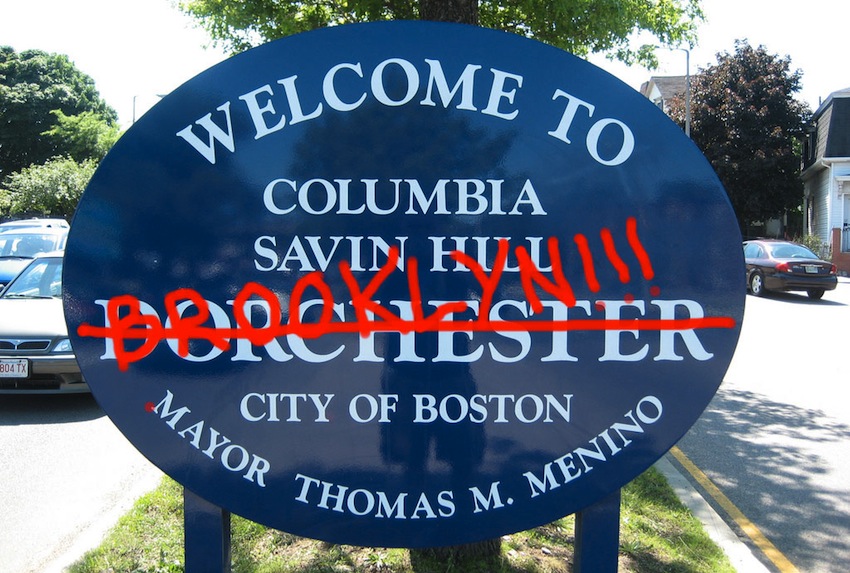No, Dorchester Is Not the New Brooklyn

Original Welcome to Dorchester sign image via Adam Pieniazek on Flickr.
“Dorchester is the new Brooklyn,” proclaimed the Lower Dot blog this Friday in a post arguing that Dorchester shares the New York City borough’s hot music scene, up-and-coming restaurant culture, and diverse mix of people.
After Universal Hub’s Adam Gaffin brought wider attention to the claim, it was greeted with suspicion, which is our nice word for “outright derision.” Leaving aside the fact that if Brooklyn were its own city, it would be the fourth largest in the United States, and that Boston in its entirety is just the 21st, there’s still good reason to argue that Dorchester is not the new Brooklyn: The title has been claimed in major publications and self-promoting neighborhood blogs more than a few times.
“Queens is the new Brooklyn,” the New York Times reported in 2005.
“Doha, Qatar is the new Brooklyn,” said New York magazine in 2008.
“Oakland is the new Brooklyn,” said San Francisco Curbed in 2009.
“Troy is the new Brooklyn,” saids All Over Albany that same year.
“Is Detroit the new Brooklyn?” asked PBS in 2011.
“Montreal is the new Brooklyn,” said the Telegraph in 2012.
“Staten Island is the new Brooklyn,” hinted Gothamist in May.
“Nashville is the new Brooklyn,” we read on Eater.com.
“Baltimore is the new Brooklyn,” sings JC Brooks & the Uptown Sound.
“Manhattan is the new Brooklyn,” joked everyone until suddenly it seemed true, according to the Awl.
It’s easy to understand why this claim has been so consistently popular. Firstly, hip Brooklyn’s culture has spread in the past decade far beyond its boundaries. It’s easy to look at your surroundings, see a new emphasis on food culture, some kids in plaid shirts, and perhaps an urban chicken coop, and proclaim yourself “the new Brooklyn.” We’re at the point where America is basically the new Brooklyn.
And second, when people say “Brooklyn” they really mean “rising standard of living” or “gentrification.” Brooklyn’s story through the past several decades is one any aspiring neighborhood would envy. The Lower Dot blog says in its description that, “We created this blog to draw attention to one part of Boston’s best neighborhood! It is diverse and hip. It offers so many shops, restaurants, and things to do.” Given that “Brooklyn” is synonymous with all these things, it serves their purposes to stoke the claim.
Unfortunately, when people talk of “Brooklyn,” they also imply a culture of early adapters—the “we were listening to this band before you” types. In that sense, proclaiming yourself “the new Brooklyn,” is so old an idea, no self-respecting hip Brooklynite would dare utter it. There’s no better way to remove any suspicion that you might be “the new Brooklyn” than to declare yourself as such.


